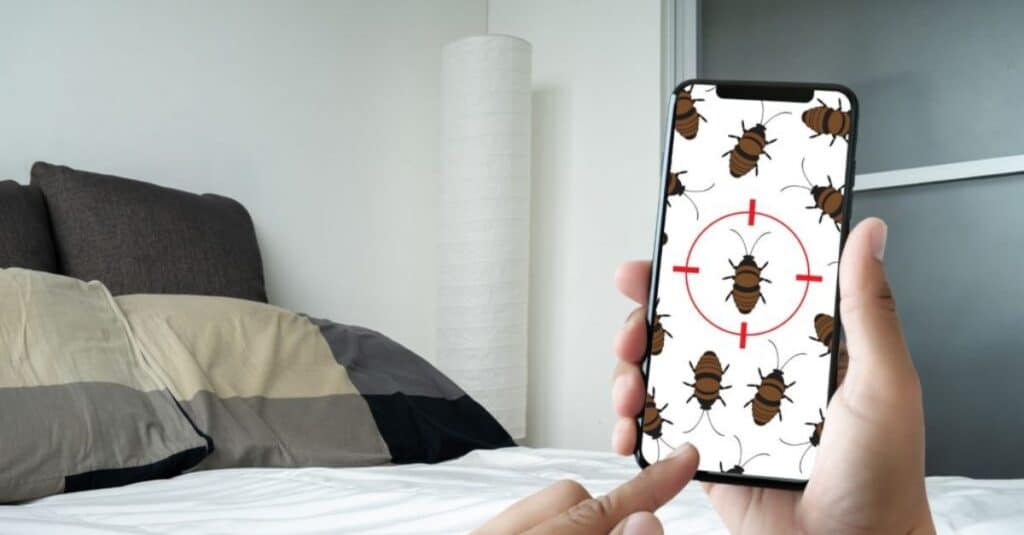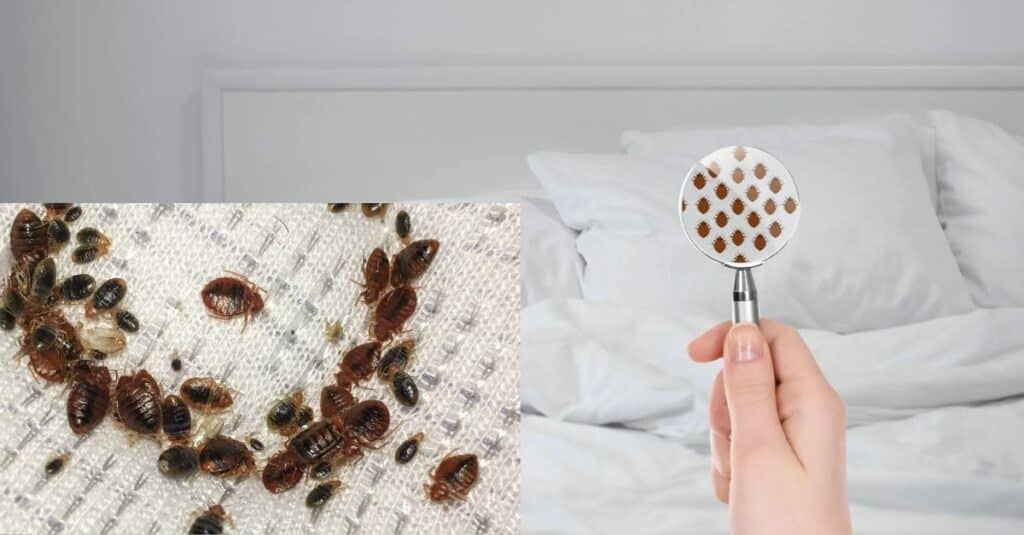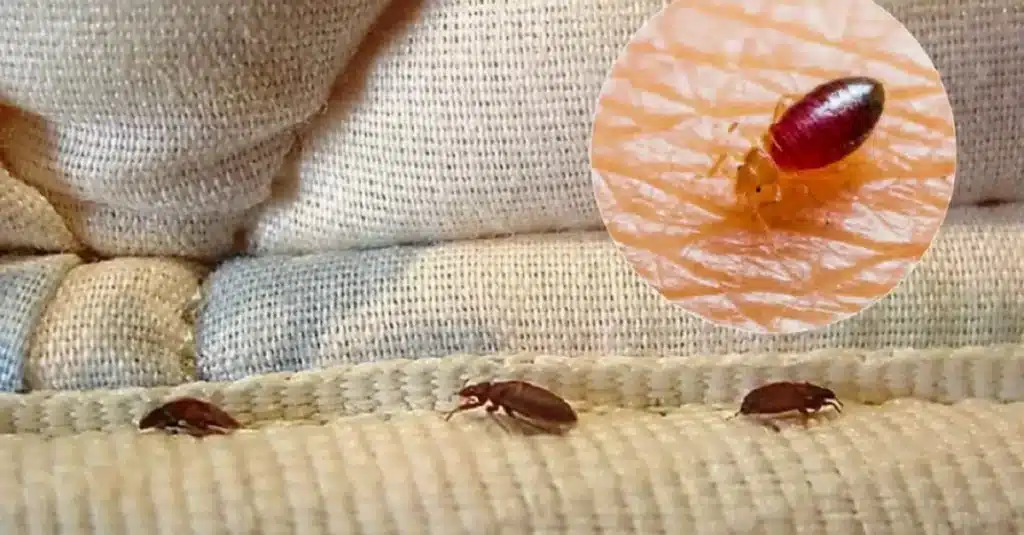Do bed bugs move from room to room? Yes, they do. Bed bugs can spread from room to room in a matter of seconds by hitching a ride on the clothing of a person who moves from room to room. Understanding how they move is crucial for preventing infestations.
What Are Bedbugs?
Bedbugs are insects that feed on the blood of animals and humans. Adult bedbugs are reddish-brown, wingless, and about the size of an apple seed.
They are flat with oval-shaped bodies. Young bedbugs, or nymphs, are smaller and can appear translucent or yellowish in color.
If nymphs have not been recently fed, due to their coloring, they can be almost impossible to spot. Bedbug eggs are tiny and white.
Where can bedbugs live?

Bed bugs can live in various places, making them tricky to eliminate. They hide in seams of mattresses, box springs, and bed frames.
These pests can also lurk in cracks and crevices of furniture, behind wallpaper, and even inside electrical outlets. Regular inspection and cleaning are essential to keep them at bay.
How big are bedbugs?
Bedbugs are tiny, about the size of an apple seed. They measure roughly 5 to 7 millimeters in length. Despite their small size, they can cause significant discomfort and inconvenience.
Their flat, oval-shaped bodies enable them to hide in tight spaces, making them difficult to detect. Despite their small size, they can quickly multiply and infest various areas in your home.
How Fast Do Bed Bugs Spread From Room To Room?

If you’ve found them at home, your first aim is to stop them from moving to other rooms fast. They can move from one room to another within seconds by catching a ride on someone’s clothes. They can also crawl between rooms in just a few hours.
The speed at which bed bugs spread depends on how soon you start treatment. To prevent spreading, learn how to act fast
Preventing the Spread of Bed Bugs at Home
Bed bugs can quickly become a nuisance if they spread around your home. Here’s how to prevent their spread and keep your living space bug-free:
- Identifying the Infestation: Look for signs like red bites on the skin, tiny blood stains on sheets, or small dark spots on furniture. Check mattress seams, bed frames, and nearby furniture for live bugs or shed skins.
- Limiting Movement: Avoid moving infested items between rooms to prevent spreading. Seal infested items in plastic bags before transporting them out of the house.
- Cleaning and Laundering: Wash bedding, clothes, and curtains in hot water and dry on high heat. Vacuum mattresses, carpets, and upholstery thoroughly, focusing on seams and crevices.
- Decluttering and Sealing: Reduce clutter to eliminate hiding spots for bed bugs. Seal cracks and gaps in walls, floors, and furniture to prevent entry and movement.
- Seeking Professional Help: Consider contacting a pest control expert for thorough inspection and treatment. Professional extermination may include chemical treatments, heat treatments, or a combination of methods.
- Monitoring and Prevention: Regularly inspect bedding, furniture, and other potential hiding spots for signs of them. Take preventive measures when traveling or staying in hotels to avoid bringing them home.
How Can Bed Bugs Travel From Room to Room?
Bed bugs don’t jump or fly, but they crawl fast, up to 4 feet per minute. There is also the possibility that they could catch a ride on the cleaning team’s materials (like a vacuum or trolley).
And it moves quickly from room to room. Once they’re in a new room, they keep spreading until many rooms are infested.
This can lead to complaints from guests and financial problems for hotels. Identifying bed bug infestations early is crucial in preventing their spread.
Training cleaning staff to recognize signs of them is essential. They should thoroughly inspect rooms and report any sightings promptly.
Implementing proactive measures like regular inspections and using smart devices can help detect them early. These measures enable timely treatment, preventing infestations from spreading to other rooms or areas within a hotel.
How Fast Do Bed Bugs Crawl?
Bed bugs can crawl at a maximum speed of 4 feet per minute, but they usually move slower. Despite their slow pace, they can cover significant distances, traveling up to 100 feet in just one hour. Their ability to crawl quickly contributes to their spread within homes and hotels.
What’s The Most Common Cause For Bed Bugs Spreading?
Bed bugs primarily spread by hitchhiking on humans or their belongings. They move quickly from room to room seeking blood meals, multiplying rapidly if left untreated.
Preventing their spread involves vigilant inspection, timely treatment, and minimizing contact with infested items.
How to Prevent Bed Bugs from Spreading to Other Rooms
Preventing the spread of bed bugs is essential to maintain a hygienic environment. By implementing proactive measures, you can curb their movement and minimize infestations in your home.
Effective Bed Bug Prevention
Because they spread and multiply so quickly, the most effective way to prevent them from spreading is to exterminate them as quickly as possible.
There are some ways you can prevent the possible spread of bed bugs from one room to another. The best approach is to put preventative measures in place to catch infestations before they spread.
Following are some precautions to prevent bed bugs:
- Inspect used furniture and clothing before bringing them into your home.
- Keep your living spaces clutter-free to reduce hiding spots for them.
- Encase mattresses and box springs with bed bug-proof covers.
- Vacuum regularly, paying attention to cracks and crevices.
- Be cautious when traveling and inspect hotel rooms for signs of bed bugs.
- Immediately wash and dry clothes on high heat after returning from trips.
- Seal cracks and gaps in walls and furniture to prevent bed bug entry.
- If you suspect an infestation, contact a pest control professional promptly.
Hotel Management’s Vigilance
Preventing the spread of bed bugs is crucial due to their rapid multiplication. Hotel managers are particularly wary of bed bug infestations, aiming to avoid their spread to other rooms.
Hotel managers strive to prevent bed bug transmission by implementing proactive measures to detect infestations early.
Despite efforts to maintain cleanliness, occasional complaints about room cleanliness are inevitable in the hotel industry.
Challenges of Bed Bug Treatment Without Professional Expertise
Treating bed bugs is challenging without proper training. Mishandling infestations can lead to bigger problems and more expenses. Seek assistance from a reputable bed bug treatment expert nearby.
Their expertise can ensure effective treatment, preventing further spread and saving you time and money. Trusting professionals minimizes the risk of re-infestation and the need for costly replacements.
What should I do if I find bed bugs in my home?

If you discover bed bugs in your home, it’s crucial to take immediate action to prevent further spread and infestation. Start by thoroughly cleaning and vacuuming infested areas, then contact a professional pest control service for expert treatment and advice tailored to your specific situation.
Prompt action can help contain the problem and protect your home from extensive damage. Even one single missed bed bug can lead to a re-infestation if you are not careful.
How much do bed bugs cost?
- Bed bug treatments vary widely in cost.
- Professional extermination can cost from a few hundred to several thousand dollars.
- DIY options like sprays and traps are cheaper.
- However, they may be less effective.
- Consider the cost of replacing infested furniture and bedding.
How Bed Bugs ‘Check In’ to Your Hotel
Bed bugs often check into hotels by hitchhiking on guests’ clothing or luggage. Once inside a hotel room, they quickly hide in carpets, bedding, or furniture.
If not detected, they can easily spread to neighboring rooms or even travel back with guests to their homes. It is easy for the situation to escalate quickly, as their breeding cycle is very quick.
A female bed bug can lay anything between one and seven eggs every day-and most produce anything between 250 to 500 eggs in their lifetime.
This means that your problem can multiply exponentially in a short amount of time-requiring you to make fast decisions to minimize the damage.
Read This Blog: HOW TO CHOOSE THE BEST WEAR-LAYER THICKNESS FOR LVP FLOORING
Spotta, a Smart System to Identify Bed Bugs
Spotta is a smart system designed to identify bed bugs in hotels and homes. Using smart devices, it alerts you when there is a bed bug presence, enabling swift treatment.
This proactive approach helps prevent further infestation and spread. Spotta’s technology is in use across the US and in Europe, offering an effective solution to bed bug detection.
By detecting them early, Spotta helps hotels and homeowners take prompt action to prevent infestations. With its automated alerts, Spotta provides peace of mind and reduces the risk of costly problems.
Frequently Asked Questions
Do Bed Bugs Usually Stay In One Room?
Bed bugs don’t usually stay in one room; they can quickly spread to other areas of a home, seeking human hosts for blood meals.
How easily do bed bugs spread?
They spread easily through hitchhiking on clothing, luggage, and furniture, crawling quickly from room to room.
What is the main cause of bed bugs?
The main cause of them is often travel or movement of infested items, as they hitch a ride on belongings to new locations.
How can I tell if we have bed bugs?
You can tell if you have them by looking for signs like shed skins, fecal spots, blood stains on sheets, or bites on your body.
How do humans get bed bugs?
Humans can get infected through infested items like luggage, clothing, and furniture or by visiting places where they are present.
How do bed bugs start in your bed?
Bed bugs often start in your bed by hitchhiking on bedding or furniture brought into your home, then hiding in mattress seams or other crevices.
Final Thought’s
Addressing an infestation promptly is crucial to prevent further spread and discomfort. Seeking professional help and implementing preventive measures can effectively control them. Remember, early detection and treatment are key to minimizing their impact on your home.
Stay vigilant, and don’t hesitate to reach out for assistance if you suspect a bed bug problem. With diligence and proper management, you can regain peace of mind and a bed bug-free environment.







